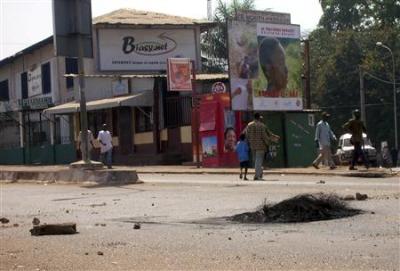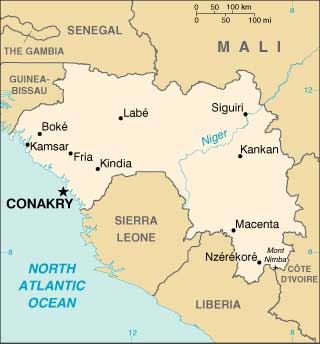Thursday, 15. February 2007
Guinea on the verge of civil war


International Crisis Group
Africa Report N°121
14 February 2007
EXECUTIVE SUMMARY
The 12 February 2007 declaration of siege and establishment of a permanent curfew and martial law by President Lansana Conté after three days of renewed violence has brought Guinea to the verge of disaster. Towns throughout the country rallied to the general strike launched on 10 January, turning it into an unprecedented popular protest against the Conté regime. The repression of the demonstrations – over 100 dead in total since January – and the nomination of Eugène Camara, a close Conté associate – as prime minister have shown the regime will do anything to ensure its survival. The international community, which has been largely quiet and absent, needs to react urgently to help produce real change if chaos that could well spread beyond Guinea’s borders is to be prevented.
Weakened by illness, Conté clings to his privileges, showing more interest in his extensive agricultural estates than the fate of the country. Receiving conflicting advice from sycophants obsessed by presidential succession and safeguarding their own material interests, he has responded to the rebellious trade unions with a mixture of carelessness, clumsiness and violence. His consent on 27 January to delegate powers to a prime minister who would be head of government and the decree he issued four days later setting out the powers of that office do not mean he will actually withdraw and that the system of rule Guineans have rejected will end soon. Nor do they remove the question of responsibility for the January and February slaughter of unarmed demonstrators.
The choice of Camara on 9 February was a tragic mistake that was received in the country as a provocation. It was promptly followed first by riots, and then by renewed violent repression. Red-berets of the presidential guard and anti-riot police fired live rounds at people but prevented neither looting nor the systematic destruction of state symbols, including property belonging to members of the government, the presidential entourage and others associated with Conté’s regime.
Guinea now faces two possible scenarios. There is still a chance, though a diminishing one, for a negotiated solution involving key Guinean, regional and wider international actors. Alternatively, if the Conté regime continues to rely on military repression, it could rapidly bring Guinea to a dramatic spiral of violence: full popular insurgency, with increasing chaos that is likely to stimulate a bloody, military take-over, leading in turn to a possible civil war comparable to those that have torn apart its neighbours in the past decade with uncontrollable consequences.
If it comes to that, the troubles are unlikely to stop at the city limits of Conakry or even the country’s frontiers. Chaos in Guinea’s Forest Region, bordering Liberia, Sierra Leone and Cote d'Ivoire, could well destabilise one or more of those frail countries. Likewise, politically unstable Guinea-Bissau could suffer if its president, Joao Bernardo Vieira, seeks to support his long-time friend, Conté.
Western governments as well as multinational firms that benefit from the country’s natural resources value political quiet but they would be making a serious mistake if this led them to support, even by passivity, an effort to retain the Conté system (with or without its creator). Guinean actors and the international community urgently need to cooperate to implement an action plan that brings about change and prevents an escalation of violence.
More: http://www.crisisgroup.org/home/index.cfm?id=4661&l=1
(Photo: REUTERS/Saliou Samb)
ieva jusionyte, 14:30h
... comment
falschebewegung,
Monday, 26. February 2007, 17:33
for some time was discussing moving there to work...
... link
ieva jusionyte,
Wednesday, 28. February 2007, 16:20
what did you plan to do? well, in any case, you'd better stay away from that place. tonight we even have a vigil for peace in Guinea here...
... link
... comment